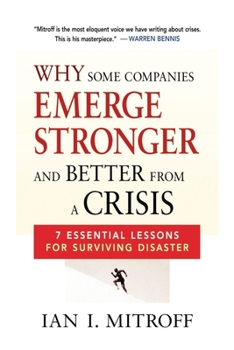Why Some Companies Emerge Stronger and Better from a Crisis: 7 Essential Lessons for Surviving Disaster
Select Format
Select Condition 
Book Overview
Do your company and employees have the necessary "IQ" not only to withstand a crisis but also come through it with strength and confidence? Like many companies over the last few years, yours has probably done a great deal to reassess its physical, strategic, and financial vulnerabilities. However, there is a huge difference between business continuity planning and true crisis management. Ian Mitroff outlines seven distinct...
Format:Paperback
Language:English
ISBN:0814413277
ISBN13:9780814413272
Release Date:March 2005
Publisher:Amacom
Length:256 Pages
Weight:0.85 lbs.
Dimensions:0.5" x 6.1" x 9.2"
Customer Reviews
3 ratings
Future success requires planning today for tomorrow's crises.
Published by Thriftbooks.com User , 15 years ago
The first lesson that you're taught in any type of crisis training is that it's not a question IF your organization will face a crisis, but it's a question of WHEN your organization will face a crisis - simply stated, every organization will face some type of crisis during its existence. However, not all companies successfully emerge from the aftermath. Companies such as Enron, Arthur Anderson, American Peanut Company, Union Carbide never recovered after their respective crises, while others such as Johnson & Johnson (Tylenol), Firestone, Exxon and MCI (WorldCom) continue to survive. Crisis management expert, Ian Mitroff lists seven essential competencies in his book that companies and individuals need to possess to endure through a crisis scenario. Soundview recommends "Why Some Companies Emerge Stronger" because its message and strategies are timeless advice that are just as relevant today as when the original work was published nearly five years ago. For example, one of the most important competencies the Mitroff lists is the need for preparation and scenario planning. While you can't necessarily predict or plan for every possibility, this simple exercise is an invaluable tool that helps debug your contingency plans and stress test your crisis model during a "dress rehearsal" rather than during an emergency situation. That's sound advice for any rainy day, especially when you consider that Noah didn't build the ark while it was pouring.
Convincing Argument for Making Crisis Mgmt Part of Business
Published by Thriftbooks.com User , 18 years ago
Crises aren't limited to computer breaches, hurricanes, and tsunamis. Unfortunately, more crises have occurred in the past few years than in the 20 years before that. Too many organizations react to crisis instead of making crisis management a part of its organization like human resources and finance. The unusual way of doing business in the past has become the normal way of doing business today. Crisis doesn't have boundaries, so it can affect a company across the board rather than in silos. Mitroff works to change attitudes and philosophy required to ensure a company correctly implements crisis management rather than addressing the basics of crisis management. The basics won't matter if companies have the wrong attitude. According to Mitroff, organizations that adopt the seven challenges improve their chances of riding out any crisis that occurs. Organizations also include public, government, and non-profits. Before 9/11, people thought the idea of a "flying bomb" was unbelievable. Unfortunately, that wasn't the case and it taught organizations a valuable lesson: be prepared for anything even far-fetched scenarios. You'd think 9/11 would encourage organizations to take a proactive stance on crisis management, but just two years after 9/11 - companies returned to their old ways and prepared to handle only few crises: natural disasters and fire. Crises have changed as they're not just "normal systems accidents," which are accidental breakdowns as a result of very complicated technology. Seven competencies help an organization survive a crisis and maybe come out of it better than before the crisis. They are: Right Heart: Emotional IQ - Learn how to get a better handle on emotions and how to deal with defense mechanisms that expectedly appear when crises occur. Right Thinking: Creative IQ - Bigger picture thinking that requires thinking outside of outside the box. Right Social and Political Skills: Social and Political IQ - Organizations look at themselves as one big entity instead of departments and that they're only in one business. All businesses are in all businesses. For example, a university is also in the food business (cafeteria) and facilities business (dorms). Right Integration: Integrative IQ - Crisis management can't be reduced to tools and techniques. Instead it's based on assumptions as there endless solutions. Right Technical Skills: Technical IQ - Must "think like a controlled paranoid," which means exploring every scenario without tossing it out as preposterous. Right Transfer: Aesthetic IQ - Included crisis management as part of an organization rather than as its own department or put in a silo. Right Soul: Spiritual IQ - Organization accept the spiritual, physical, and mental areas exist together not separately. It lets organizations deal with problems that result from unnaturally splitting up these areas. The book influences the reader to look at crisis management differently and to convince the organization of t
IMPRESSIVE IN SCOPE, PENETRATING THOUGHT, & INSIGHTS.
Published by Thriftbooks.com User , 18 years ago
The book presents seven essential challenges all organizations face in today's environment, along with seven essential lessons that are key to successfully facing and overcoming them. The lessons concern: emotional preparedness; creative thinking; spiritual strength; political and social skills; technical skills; integration of areas of knowledge and emotions; and innovation. Mitroff closes his discussion by expanding his thinking to the societal level. The book is filled with penetrating and challenging thought encompassing many perspectives and providing numerous insights. Mitroff approaches crisis management in a highly innovative way and takes it to a new level.





